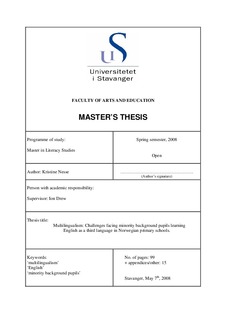Multilingualism : challenges facing minority background pupils learning English as a third language in Norwegian primary schools
Master thesis
Permanent lenke
http://hdl.handle.net/11250/185316Utgivelsesdato
2008Metadata
Vis full innførselSamlinger
- Student papers (HF-IKS) [909]
Sammendrag
This thesis explores the challenges facing minority background pupils in the process of
acquiring English as an L3 in Norwegian primary schools. However, in order to investigate English as an L3, English needs to be seen in relation to the learners’ L1 and L2. The research is primarily qualitative, based on observations in two classes, interviews with EFL teachers, introductory course teachers, a headmistress and councillors at three schools. In addition, the research includes a case study of a group of minority background pupils whose second language is Norwegian and third language is English. Available test results from the school where the case study was conducted add a quantitative dimension to the research.
The thesis aims at both presenting the situation for some minority background pupils
in Norway, and also at discussing the current situation for minority background in Norway in general. It introduces the educational context for minority background children and presents the various introductory programs in Norway, the Ministry of Education’s strategy plan,curricula for mother tongue and second language education for speakers of minority
languages, and the English curriculum. Relevant theory, such as introductions to the fields of bilingualism and multilingualism, is provided. In addition, there is a description of various writing systems, such as deep and shallow orthographies. Some research studies that are
related to the target group of this thesis are reviewed, both comparative case studies and comparative international studies.
It was found that minority background children meet various challenges when
integrating in Norway. Firstly they often have to complete an introductory course before commencing at a regular school. Secondly they have to integrate into a Norwegian primary school where the language of instruction in all subjects is Norwegian. At the same time they have to start the process of acquiring English as an L3. In general their level of English was lower than that of their Norwegian peers. Factors such as the mother tongue, interlanguage transfer, ethnic background, and the learning context may influence the minority background children’s acquisition of English. It was found that the minority background pupils’ level of Norwegian was of great importance in the process of learning English. In addition, parents’attitudes and in some cases, ethnic backgrounds also appear to influence the children’s learning. The Early Years Literacy Programme at the case study school, with its focus on
individual learning, also appeared to have a positive effect on the minority background
children. Finally the importance of teacher qualifications of those teaching minority
background children was emphasised.
Beskrivelse
Master's thesis in Literacy studies
